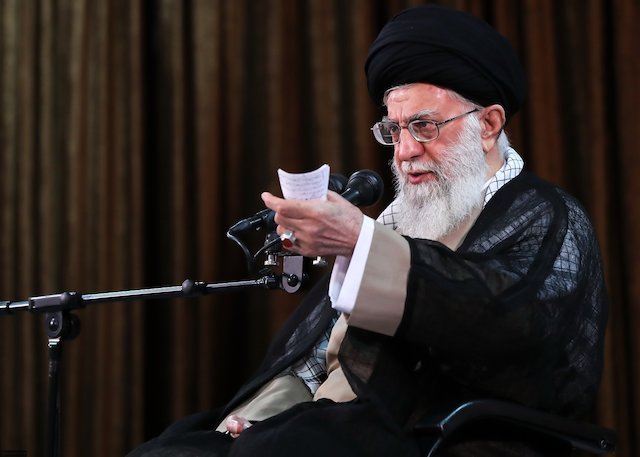Alwaght- Leader of the Islamic Revolution Sayyed Ali Khamenei said on Saturday the assumption that Iran's problems can be solved by negotiations or relationship with the US was "a blatant mistake," emphasizing "The US has fundamental issues with the essence of the Islamic establishment."
“I have long pointed out that it is not possible to count on the words and even the signatures of the Americans, so negotiations with the United States are useless," the Leader said in a meeting with Iranian ambassadors and diplomats in Tehran, adding that "Many countries in Africa, Asia or Latin America have relations with the US, and yet they are suffering from plenty of problems.”
Ayatollah Khamenei touched on "deep-rooted" US animosity with the Iranian nation, saying Washington's opposition to Iran's nuclear capabilities and role in the region is rooted in its hostility with "the elements of the authority of the Islamic system."
The Leader said the Americans want to return to the position they were in Iran before the Islamic Revolution in 1979 when the former Shah was a key ally of the United States, adding "they will not be satisfied with anything less."
With the Europeans, talks should continue to guarantee Iran's interests under the 2015 nuclear deal which the bloc wants to preserve despite Washington's withdrawal in May.
The leader of the Islamic Revolution regarded activation of unexploited or not properly-exploited capacities in the country as important and added "Negotiations with the Europeans should not be cut off, but we should not wait too long for a European package and instead, we should do a lot of work inside the country.”
Earlier this month, Iran said it had rejected the European Union’s so-called package of proposals for the future of the 2015 nuclear deal from with the US withdrew in May. Details of the proposals were never made public.
However, Tehran said it had returned the package for revisions, saying the bloc’s proposals did not guarantee that the Islamic Republic would benefit from the nuclear deal if it stayed in the agreement.
No regional country to export oil if Iran's Crude export is blocked
Elsewhere in his remarks, Ayatollah Khemenei echoed his support for Iran's President Hassan Rouhani who had warned that no oil cargo would be exported in the region if Iran's oil exports were to be halted.
He described President Rouhani's remarks to that effect as important and emphasized that Iran's Foreign Ministry should take the adequate measures to follow up the president's position.
“The remarks made by the President in his recent trip to Europe stating that, ‘if Iran’s oil export is blocked, no other country is region can export oil either,’ are important remarks that represent the approach and policies of the establishment. The duty of the Ministry of Foreign Affairs is to strictly pursue stances taken by the President.”
He referred to relations with scientists, non-state political figures and economic activists of other countries as popular methods of diplomacy in the world and went on to say: "through these methods, the range of the activities of the foreign policies department can be expanded."
The Leader of the Islamic Revolution further called field power a backing for practicing diplomacy and asserted: “it is important to turn every element of power into some political and economic achievement."
The Supreme Leader slammed any bid to portray ideologies as contrary to national interests, adding: "Some—erroneously—talk about the necessity of separating diplomacy from ideology; whereas, there is nothing wrong with ideological diplomacy. Inculcating [in public opinion] that there exists a contradiction between ideology and national interests is wrong and illogical,” said Ayatollah Khamenei, citing examples of practice of politics based on ideology elsewhere in the world: “U.S. officials repeatedly mention "American Values" in their speeches—which represents their ideology, derived from the U.S. Declaration of Independence. In European countries, too, ideological views rule over their political behavior and activities.”
Finally Ayatollah Khamenei described the main goal of the Islamic Republic as protecting national interest of Iran and asserted: “The goal of establishing the Islamic Republic is to safeguard national interests, independence, freedom, social justice as well as national power and security. [IRI] Ideology seeks to provide and protect national interests and is thus considered a nation's identity.”
Before Ayatollah Khamenei’s remarks, Iran’s Foreign Minister Mohammad Javad Zarif said his ministry had devised a comprehensive plan to help expand the country’s economic bonds with neighbors as well as others.
Zarif said Iran’s Foreign Ministry had also been able to successfully foil what he described an Israeli project to portray Iran as a threat.
He recalled efforts by US President Donald Trump and Israel’s Prime Minister Benjamin Netanyahu to scare the world away from Iran, calling such efforts as “cheap theatricals” that had resulted in nothing but their own isolation.
Zarif further said that “war rooms” had been created in certain countries to pressure Iran, but those efforts were futile.
He said Iran had told other countries including America’s allies that confronting the American bullying should go beyond political commitments and involve practical measures.
“We have gone through hard times,” the Iranian minister said. “We will be able to overcome problems through cooperation and unity without suffering any harm under the guidance of the Leadership and the help of the people.”



























